Letter from Venezuela: Anti-imperialist demonstration brings Bolivarian masses to the streets
‘PDVSA es del pueblo’
(PDVSA belongs to the people)
The Bolivarian masses again rose to the challenge of opposing terrorism and the latest imperialist assault on the national oil company PDVSA and filled the boulevards of Caracas with their revolutionary energy, enthusiasm and determination on Saturday May 28. And what a crowd it was! Mainly drawn from the popular movement, from the hills around the capital, the oil workers and the participants in the numerous misiones, the demonstration gave a very concrete feeling to what the ‘masses in action’ means as well as to their contagious enthusiasm.
Dancing, singing, chanting, and of course the usual corrosive sense of humour dominated the march. The presence of many women (not just a few older abuelas or grandmothers), who were possibly the majority of the demonstrators, clearly shows the success of the revolution in waking up formerly inert layers of society. This also shows just how deeply the revolution has penetrated society. A large contingent of indigenous people in traditional dress, who have been given rights for the first time since Simon Bolivar, also stressed their allegiance to the revolution.
In the week running up to the demonstration many rallies were held at the different PDVSA plants and facilities across the country, bringing together oil workers, people from the communities and the participants in the many misiones.
This time the government’s call for mass mobilisation, which was made through television and radio stations, was directed against the sabotage of the PDVSA oil company and for the extradition of Luis Posada Carriles, the Cuban exile, anti-Castro CIA agent of Venezuelan nationality wanted for his involvement in terrorist attacks in the 1970s. He is now currently in the United States where he was arrested for violating immigration laws!
Posada Carriles is responsible for the explosion of a Cuban airplane in 1976 that killed 73 people. Over the past few weeks the demand for the extradition of Posada Carriles has become the focal point and a symbol of anti-imperialist mobilisation, even more so now that the US administration has said that it does not intend to hand him over to Venezuelan authorities as international agreements stipulate. The Bolivarian government is considering cutting diplomatic relations with the United States if the Bush administration refuses to give in to the extradition demand.
US imperialism: a change of tactics, but the strategy is still the same
The sabotage of PDVSA by opposition forces and CIA agents inside the company became public knowledge at the beginning of May. The result of this sabotage has been a fall in oil production and a decrease in profit. This has coincided with a right-wing press campaign full of lies aimed at creating an atmosphere of unrest and instability. Despite the fact that the figures for the decrease in oil production 'revealed' by the opposition are clearly exaggerated, there does seem to be an actual drop in production.
This is no accident. The oligarchy and US imperialism never accepted their defeat. They do not give a damn about the democratic legitimacy of the government or Chavez who have won nine successive democratic elections since 1998. Some people imagined that US imperialism and the Venezuelan oligarchy would calm down after the referendum in August last year. The truth is that imperialism and the oligarchy will never rest until they get what they want. As Chavez explained recently: ‘The strategy of American imperialism has not changed, they just adapted their tactics'. The imperialists know very well that the income of the oil company represents the lifeline of the very important misiones, the vehicle of the numerous social reforms. One banner at the demonstration captured this very well by describing PDVSA as the mother of the misiones (la madre de las misiones). By attacking the oil company the imperialists are going ‘for the jugular’, hoping to cut the means for social reforms, and thereby undermining the social support for the revolution.
In December 2002, the mobilisation of the oil workers together with the communities and revolutionary sections of the army, which took over the installations and ran them under workers’ control, broke the bosses’ oil lockout. Since then thousands of managers and technical staff responsible for this blatant sabotage have been sacked. This has left a gap at the various levels of management, especially since the workers’ control imposed by revolutionary oil workers has been slowly but surely rolled back. To the extent that the workers’ control of production and the vigilant mobilisation of the community have declined and been replaced by classical bourgeois methods of production, the possibility of internal sabotage has increased. A new technocracy and bureaucracy have crystallised and have become the force behind the attempts to strangle PDVSA from within. This is what people call the paro silencioso or the ‘silent strike’ of the oligarchy.
Young oil workers at the demonstration told the comrades of the Corriente Marxista Revolucionaria their story: “The situation is that at the managerial level the dedicated revolutionaries are in a minority. On the other hand it is only a small number staff at that level who are openly escualidos or counterrevolutionaries. The group in between, the bulk of managers, are neither with nor against the revolutionary process. You cannot reproach them for not doing their work because they just do the minimum amount of work required. But that is enough and creates the situation where sabotage can do a lot of damage.”
These young workers showed great interest in the idea advanced by the CMR that workers’ control would be the only way to combat internal sabotage in the oil company. Workers’ control, as explained by the CMR, consists in the workers themselves electing their managers and other staff at every level of the company. These elected representatives must also be subject to recall. This is what is happening at the Alcasa aluminium factory where the workers increased productivity by 11 % and used these methods of workers’ control to combat corruption and inefficiency.
It is the opinion of the CMR that workers should elect their representatives and bring them together in an Asamblea Constituyente Petrolera (a Constituent Assembly of Oil Workers), which, hand in hand with representatives of the government and representatives of the entire working class and the popular movement, would elect a leadership of PDVSA and define its policy.
This position was explained and distributed in a leaflet at the demonstration and attracted a lot of interest. A young worker from the neighbourhood of Petare and member of the CMR told us that many people came to the stall to get bundles of 50 or 100 leaflets to distribute in their part of the country.
This demonstration was a massive show of strength. Nevertheless it will not be enough to stop the sabotage of the oil company. The government has reacted to the situation over the last few weeks by deploying military personnel around several PDVSA plants. This will not be sufficient either, as the sabotage of production is a result of deliberate mismanagement and neglect. Oil workers also told us for instance that pipelines that are not taken care of and serviced for a few days become completely useless because the oil solidifies and becomes hard as rock. There are many ways PDVSA can be sabotaged from within. The use of cooperatives as a means of subcontracting some tasks, which in the past were handled by the oil workers themselves, has also created room for sabotage.
The organised workers’ movement, starting with the trade unions, has a special responsibility in this struggle. Unfortunately, although many were present at the demonstration, the trade unionists did not participate as an organised force and did not present their own visible demands.
As a means of self-defence the government is now denouncing the multinationals that have operating agreements with PDVSA. According to PDVSA president Ramírez, 90% of those companies have committed tax evasion, cheating the Venezuelan state out of $3 billion in taxes and $1 billion in royalties.
The government has declared that this money will have to be paid back. In the weeks before the march Chavez also insisted in using part of the central bank foreign exchange reserves (which amounts to US $29 billion) in order to finance the necessary social reforms and to invest in productive activity.
It is clear that the Bolivarian government is preparing for a collision with US imperialism and its fifth column the local oligarchy. The masses are ready to respond at short notice again as they have shown. They know that imperialism represents a deadly threat to the revolution.
The masses also know that the main danger to the revolution is the ‘enemy within’, all those half-hearted revolutionaries or escualidos wearing the red beret who are the instruments of the counterrevolution.
Do not be confused by the happy, almost festival like atmosphere of the march. Beneath the alegria revolucionaria (revolutionary euphoria) there is the determination and the coolheaded desire to complete the revolution. Socialism will give the masses the necessary tool to achieve this goal.
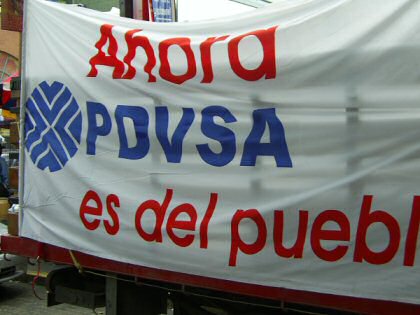 |
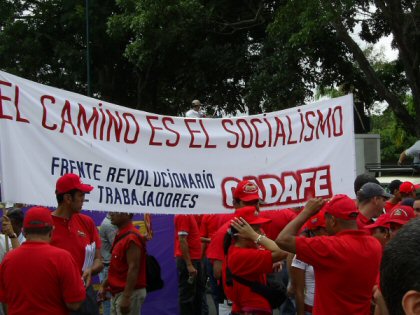 |
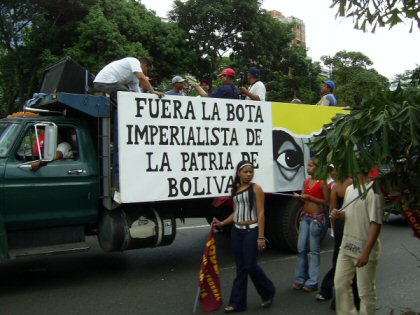 |
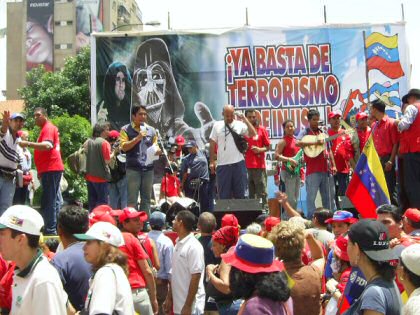 |
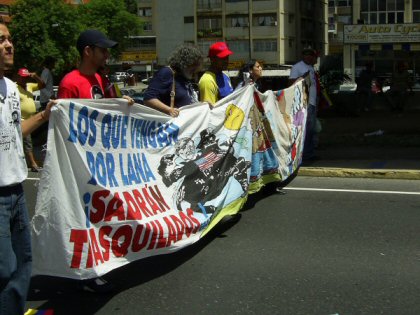 |
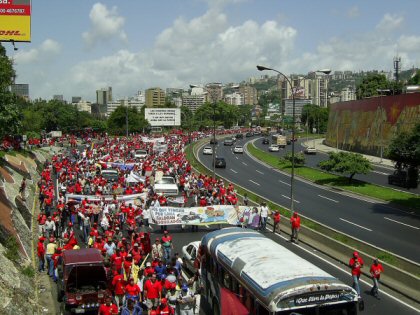 |

 Please help build the campaign by
Please help build the campaign by 